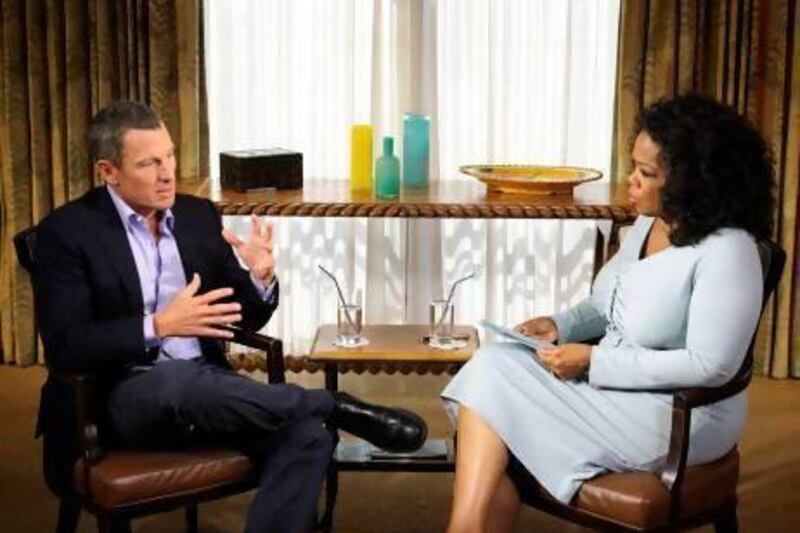The thing about lies is that they are warm and comforting.
The alternate reality they create becomes a little log-cabin haven, where at first refuge may be sought but where ultimately, permanence is always the very seductive target.
The more you lie, the grander you lie, the headier it becomes.
After a while you forget why you were lying in the first place, which lie squares up with which other lie, which squares up with a half-truth, which squares up at all.
Once you choose to begin telling the truth, you go into it blind, not knowing which forgotten lie among all the lies threatens to bring the truth itself down.
Just remember this a day before we watch Lance Armstrong take his place opposite Oprah Winfrey (brief digression: she's still doing these softly-softly interviews?).
Now I would have found it as funny as anyone if, contrary to all reports from the last few days, Armstrong had gone on Oprah and actually not confessed to anything. But that is not really happening, not now that Oprah has tweeted that he has confessed.
Instead we come to the question of how much, in the face of all the lies, Armstrong's truth will ultimately be worth.
The fact of him being on Oprah lies some kind of answer.
When news first emerged that Armstrong was going on Oprah, my mind turned immediately to the legendary David Frost-Richard Nixon interviews of 1977, in which the British interviewer squeezed a (sort of) confession from the former US president about the Watergate scandal that brought him down.
There are parallels.
The film about those interviews, Frost/Nixon, makes Frost out to be a fairly shallow celebrity-journalist, that - much like Oprah - he would not be able to conduct the serious, searching examination his subject direly needed.
Some believe that was overplayed but the reality is Frost was sneered at by contemporaries and he was not in a good place professionally.
Nixon, like Armstrong, had many lies that needed unravelling of course.
But the stronger parallel is in the purpose of the interview; both Frost and Nixon needed it professionally.
It provided Nixon with a shot at redemption (as well as a fat payday) and one at everlasting journalistic credibility for Frost.
I do not claim to know how Oprah's feeling about her professional place in the world right now, but publicity has probably never a bad thing for her. And she did tweet that "in terms of my career, this is certainly the biggest interview I have ever done in terms of exposure" (Michael Jackson, sadly, is not around to tweet back).
And Armstrong - especially Armstrong - needs this interview to work. He wants his redemption.
He needs it: morally, financially, physically, how does it really matter? He could want nothing else by appearing on Oprah, because there is no greater redeemer of sins in the modern world than Oprah on the television. But the truth as told to Oprah is not ever the kind of ugly, cleansing truth that is needed.
Master publicist that she must be, Oprah has half-played on this, tweeting ambiguously that Armstrong "did not come clean in the manner I had expected. It was surprising to me." (Did he sing it out? Or morse code it to her?)
But it is not the kind of truth that people who are not Oprah want.
Not David Walsh and TheSunday Times, the writer and newspaper that pursued the allegations against him most doggedly.
They took out an advert in the Chicago Tribune, addressed to Oprah, instructing her on how properly to cross-examine Armstrong.
Maybe that was a righteous bit of media posturing, but given that Armstrong at one time sued the newspaper for libel and won a settlement, it is at least understandable.
Neither, you suspect, will antidoping authorities be satisfied just yet.
The USADA (US Anti-doping Agency) apparently wants a full debriefing with Armstrong, where according to a source in a USA Today report, he would have to "answer every question, give over records, telephone calls, test results, everything."
Federal legal authorities might also want more than what they get on an Oprah confessional.
As the meticulously-constructed 1,000-plus pages of USADA evidence shows, there are many, many lies to get through. And this is the final thing about lies.
Just as that first lie is located at the starting point of a very slippery, downwards slope, the irony Armstrong may come to see over the next few days, is that the first truth often is as well.
Follow us
[ @SprtNationalUAE ]





